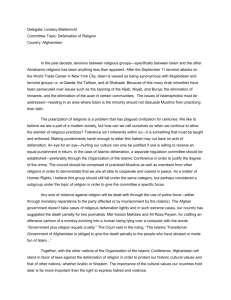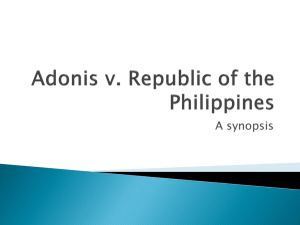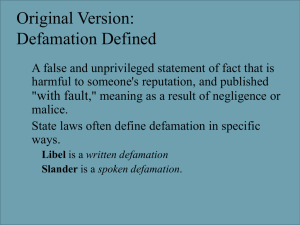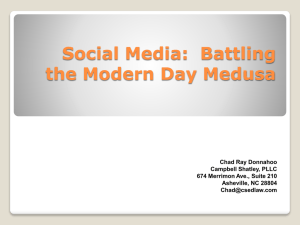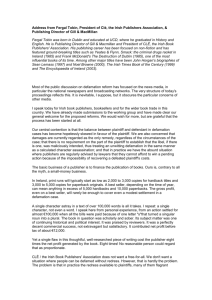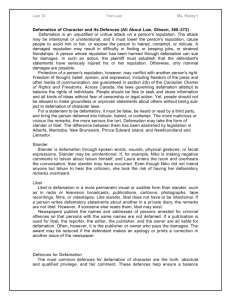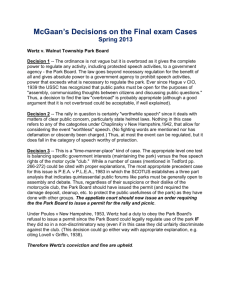A Paper by Eamonn Kennedy, Director of Legal Affairs at RTÉ
advertisement
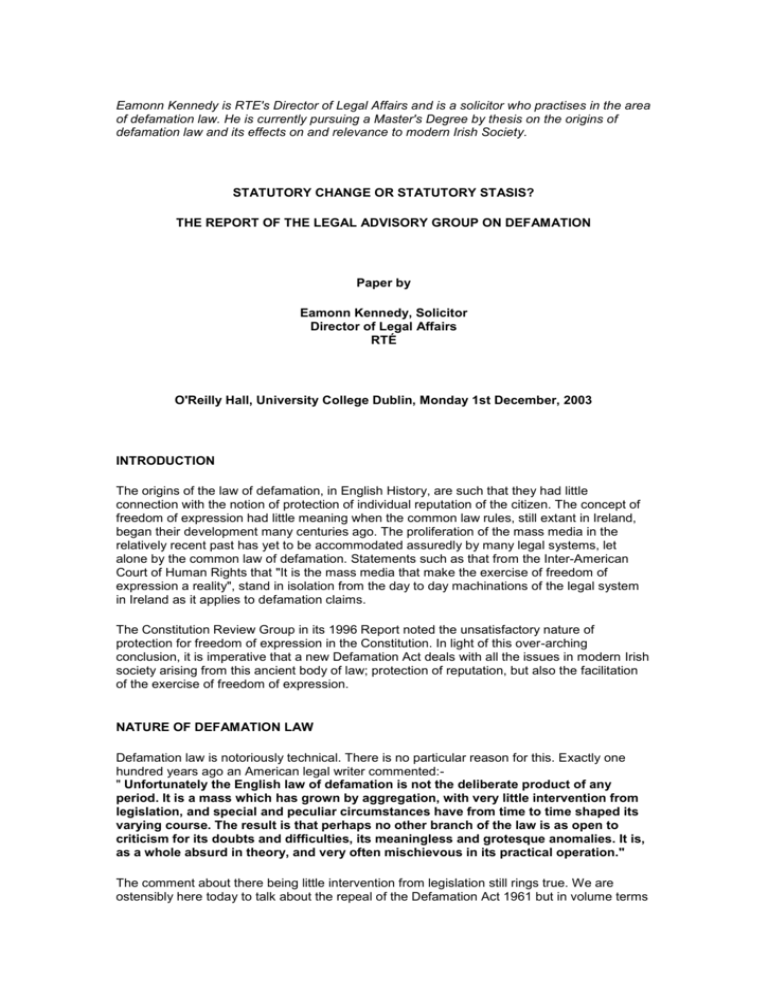
Eamonn Kennedy is RTE's Director of Legal Affairs and is a solicitor who practises in the area of defamation law. He is currently pursuing a Master's Degree by thesis on the origins of defamation law and its effects on and relevance to modern Irish Society. STATUTORY CHANGE OR STATUTORY STASIS? THE REPORT OF THE LEGAL ADVISORY GROUP ON DEFAMATION Paper by Eamonn Kennedy, Solicitor Director of Legal Affairs RTÉ O'Reilly Hall, University College Dublin, Monday 1st December, 2003 INTRODUCTION The origins of the law of defamation, in English History, are such that they had little connection with the notion of protection of individual reputation of the citizen. The concept of freedom of expression had little meaning when the common law rules, still extant in Ireland, began their development many centuries ago. The proliferation of the mass media in the relatively recent past has yet to be accommodated assuredly by many legal systems, let alone by the common law of defamation. Statements such as that from the Inter-American Court of Human Rights that "It is the mass media that make the exercise of freedom of expression a reality", stand in isolation from the day to day machinations of the legal system in Ireland as it applies to defamation claims. The Constitution Review Group in its 1996 Report noted the unsatisfactory nature of protection for freedom of expression in the Constitution. In light of this over-arching conclusion, it is imperative that a new Defamation Act deals with all the issues in modern Irish society arising from this ancient body of law; protection of reputation, but also the facilitation of the exercise of freedom of expression. NATURE OF DEFAMATION LAW Defamation law is notoriously technical. There is no particular reason for this. Exactly one hundred years ago an American legal writer commented:" Unfortunately the English law of defamation is not the deliberate product of any period. It is a mass which has grown by aggregation, with very little intervention from legislation, and special and peculiar circumstances have from time to time shaped its varying course. The result is that perhaps no other branch of the law is as open to criticism for its doubts and difficulties, its meaningless and grotesque anomalies. It is, as a whole absurd in theory, and very often mischievous in its practical operation." The comment about there being little intervention from legislation still rings true. We are ostensibly here today to talk about the repeal of the Defamation Act 1961 but in volume terms that piece of legislation contains very little of the law of defamation which is principally defined by the common law rules of defamation (English with some modification by Irish Judges); with the rules of practice and procedure and law of evidence being very important adjuncts. It is important that this reality is firmly in all of our minds. This process should not be about the replacement of a somewhat slim Act of the Oireachtas by a revised version if this process does not amount to a meaningful examination of the relationship between rights of expression and rights of reputation. THE WEIGHT OF HISTORY Much of the media's concern about defamation law is the high awards that attend court cases in this area. However, while there is a certain truth in this, the debate around this hides the fact that the "size of damages" question is merely the most visible part of the edifice. Much of the structure of our civil law on liability for injury to reputation remains obscured by popular debate on this one subject. One legal writer from 1978 illustrated this point by saying:"The preoccupation of our law of defamation with damages has been a crippling experience over the centuries. The damages remedy is not only singularly inept for dealing with, but actually exacerbates, the tension between protection of reputation and freedom of expression, both equally important values in a civilized and democratic community." Even before the beginnings of constitutional activism in the U.S. in the area of defamation law in the 20th century, an American legal writer was of the view that:-"[T]he crude AngloSaxon notion of vindication of honour by getting cash has become unsatisfactory to many decent people. They want a less sordid and convenient procedure ..". DISPARITY BETWEEN LEGAL THEORY AND LEGAL REALITY Even for lawyers, there is a shocking disparity between how the law of defamation works in practice compared to the theory as set out in text books. Even with knowledge of this fact and making proper allowances in each case, it is still very difficult to advise where liability will fall, with the degree of precision that is expected in other areas of the law. The defences available to publishers in defamation actions, typically justification (truth), fair comment and privilege can be easily described and can be lauded as the pillars for the protection of free speech. The reality is of a grimly different order. Indeed it has been said these defences with their myriad limitations and qualifications become the focus of a libel action and that their convolutions are usually responsible for the often staggering expense litigants incur in defamation cases. It could hardly be said that the internal architecture of the legal system meets the need of balancing the rights of the press with the right of reputation in this day and age. The legal system has been slow to recognise these problems and issues. Until relatively recently common law judges apprehended few of the matters that has defamation law, as one writer put it, "in a state of ferment". The system had assumed a congruence between the legal rules and their practical effect. Judicial pronouncements on the compatibility between laws for the protection of reputation and international instruments on freedom of expression, had in the main assured us that there were no issues. However, in the last 10 years or so, common law judges have shifted their ground somewhat partly as a result, I suspect, of the nefarious behaviour of certain plaintiffs in hoodwinking the public and partly because of the jurisprudence coming from Strasbourg and the associated legal literature. A lot of the media's enthusiastic call for change has centred around the House of Lords decision in Reynolds. However, the earlier case of Derbyshire County Council v Times Newspapers, I believe was the first significant reality-check by the judiciary in this area; " What has been described as "the chilling effect" induced by the threat of civil actions for libel is very important. Quite often the facts which would justify a defamatory publication are known to be true, but admissible evidence capable of proving these facts is not available". More recently a Judge in the English Court of Appeal accepted a submission on behalf of a newspaper that the decisions of the European Court demonstrated that the freedom of the press has in the past carried greater weight in Strasbourg than in the English Courts. STRUCTURAL CHANGE In general terms the Report of the Legal Advisory Group is to be welcomed. The Report represents the beginning of a debate on the nature of rights of expression and the extent and way reputation should be protected. However, I am of the strong opinion that careful consideration must be given to ensuring that sensible recommendations are not merely incorporated in a statute. There must be pause for thought to consider whether statutory reform will make a difference in reality. Theoretical reform is no reform. Bearing in mind the disparity between legal theory and legal practice in this area, I believe that further thought is required in relation to putting in place all necessary measures in the Irish legal system to make a new regime work for everybody. I now want to focus on two very practical scenarios so that this debate can see the type of issue that needs further consideration. First there is the very real case of a prisoner (serving a custodial sentence for a very serious assault on a Guard) who was featured in a newspaper article but was incorrectly identified as a sex offender. The legal system produced the result whereby this man's reputation was vindicated by an award of over €,000 plus payment of legal costs. Surely a case like this is one where the sledgehammer of damages must yield to other remedies to vindicate reputation? Can I next turn to a decision of an English High Court judge about six weeks ago. The decision was under new English procedures whereby significant matters in a defamation action can be determined prior to a full hearing, thereby avoiding excessively long trials but also, and perhaps more importantly, enabling the significant issues in a case to be set out prior to a full hearing and thus enabling the parties to d ecide whether they wish to proceed to full trial or not. In this case called Oliver v Chief Constable of Northumbria, a senior officer in the Northumbrian police force began defamation proceedings against his employer following press releases which criticised the work done by Mr. Oliver in putting together an official report concerning a murder enquiry. Unlike in an Irish scenario this matter did not go to full trial with both parties contesting the significant points of defamation law at the trial in front of a jury. Instead a preliminary hearing was held in front of a judge to determine the following issues:(1) Mode of trial; (2) What, if any, defamatory meaning the words complained of bear; (3) Whether the defence of fair comment is available to the defendant; (4) Whether the publications took place on occasions of qualified privilege; and (5) Discovery of documents. The English legal system through this efficient procedure determined:1. 2. that the case at trial should be heard by a judge alone as the matter would require prolonged examination of documents and this could not be conveniently carried out with a jury; following a relatively detailed consideration of the law on the question of the meaning of words, which meanings could not be reasonably sustained, and left for the full trial other possible meanings of the words complained of; 3. 4. after a consideration of the law relating to fair comment, that the defence of fair comment was not available to the defendant in the case (having considered European Court of Human Rights jurisprudence on the matter); and following a consideration of all the relevant cases, that there was no real prospect of the claimant being able to establish that the occasion of the publication of the press release was not protected by qualified privilege. Therefore both parties were in a position to know the real and significant issues in this case prior to a full trial proceeding with witnesses being examined and crossexamined. In Ireland defamation cases are not treated in this fashion and are run, for the most part, on the basis of all out war (when the jury is present) occasionally tempered with relatively short applications in relation to legal matters (when the jury is not present). In my opinion it can not be said that this is a satisfactory method for determining important issues. A full trial with a jury is no place to debate points of law and I think it is fair to say that justice in these circumstances can be somewhat of a lottery. It is imperative that serious issues worthy of prolonged consideration are taken out of the trial by jury process. Practice and procedure in Ireland must be suitably adopted to do this. Likewise, if an appropriately formulated defence is incorporated into new legislation to protect the media in publishing matters of public concern, this must be accommodated by appropriate pre-trial procedures so that the exorbitant costs associated with jury actions can be avoided. In this regard, I refer you to an English case called GKR Karate Ltd v Yorkshire Post, a defamation action in which a newspaper pleaded a Reynolds defence in respect of matter published concerning the running of a karate club in Yorkshire. The English Court of Appeal held that the appropriate rule of court empowered an order to direct a separate trial of any issue and to take any step or make any other order for the purpose of managing the case and further the overriding objective of enabling the Court to deal with cases justly. That included saving expense and dealing with the case proportionately, expeditiously and fairly. In this particular case, the Court of Appeal said that it was fair, sensible and economic to determine the issues of privilege and malice first in the proceedings against the newspaper defendants and in advance of the issue of justification. The Court of Appeal noted that the order of the judge in the case had obvious advantages. It was reckoned that the trial of the preliminary issues would take three days or so whereas a full trial which included the issue of justification would take four to six weeks. In my opinion if proper and appropriate defences to be afforded to defendants in libel actions are to have real meaning, then issues such as these must be teased out and considered by the Irish legal system. THE NEED TO START AFRESH A new Act needs to set out the basic philosophy behind these reforms to guide the courts' future consideration of points of contention coming before them. The Government of New South Wales did just that last year when promoting what became the Defamation Act 2002. I set out below the wording with some modifications:"Objects of Act The objects of this Act are as follows: (a) subject to everyone's right to freedom of expression (including the right to express opinions and to receive and impart information), to provide effective, appropriate and proportionate remedies for persons whose reputations are harmed by the publication of defamatory matter; (b) to ensure that the law of defamation does not place unreasonable limits on the publication and discussion of matters of public interest and importance; (c) to promote speedy and non-litigious methods of resolving disputes concerning the publication of defamatory matters; (d) to promote the resolution of proceedings for defamation before the Courts in a timely manner and avoid protracted litigation." This wording would provide a legislative formulation for the intention in the Legal Advisory Group's statement at the end of paragraph 3 of the Report that "the recommendations should be viewed as an inter-linked package which contains within itself the appropriate checks and balances designed to protect all relevant competing rights both under the Constitution and under relevant international instruments." PRESUMPTION OF DAMAGE One of the most frustrating things encountered as a practitioner acting for a publisher in a defamation case is the situation where the person bringing the claim set outs in the documents of claim, usually in strident terms, the most harrowing account of the damage the broadcast or article has had on his reputation and the devastating effect on his life. Yet when matters come to be settled the main issue can be money with the form of apology taking a back seat, if not forgotten about entirely. This rule is much criticised. It is anomalous in the law relating to civil claims. A person can recover a large sum in damages even if there is little damage to their reputation and even if the allegations were unlikely to have been believed by anybody. A witness in a libel case will not be required to give evidence as to whether or not they believed what was said about the person who brought the case. This should make one uneasy as clearly it is a situation ripe for exploitation by the mendacious, the two-faced and the fraudulent. There is every reason to abandon the rule. This has been done, I understand in the states of New York, Kensas, and Arkansas. It is unacceptable in a legal system in this day and age that a claimant is not subject to even a modicum of scrutiny to see if the claim is worthy of an award of a significant sum of money, particularly where the effect of the award will probably also result in a costs award against the publisher and is a restriction on the publisher's right of expression. The proposals in Head 7 in relation to the verifying affidavit for anyone bringing a defamation claim is a step in the right direction but why not ensure that the balance between plaintiff and defendant is formed in a more balanced way by requiring some proof of harm? In any event the impact of the doctrine of proportionality may also be relevant here. Where an award of damages is to be made by a judge or jury, Article 10 of the Convention on Human Rights requires that a Court in awarding damages (and this would include juries) acts proportionately. Therefore in Head 16, the guidelines on the award of damages, paragraph (3) should include an additional matter, namely; the evidence received concerning the extent of the injury to the reputation of the plaintiff. This would do two things. First reduce the possibility of claimants bringing insufficiently serious claims or indeed bogus claims to trial in the High Court before a jury. Secondly, it encourages the use of alternative remedies to damages, particularly by those people who do not see damages as an appropriate method of vindication of reputation in their circumstances (there are people like this!). This is borne out by the approach of the European Court of Human Rights in such cases as Maronek v Slovakia and Tammer v Estonia, cases in which severity of the financial penalty involved was the critical issue. It would seem that a country's defamation law system is required to protect a private person's reputation (and a public figure's private personality) from undue interference. However, when in fact (i.e. in reality) the interference does not amount to an excessive intrusion, a significant award of damages becomes unlawful. I would refer you to the very clear provisions of the Slovak civil code as set out in paragraphs 45 to 49 of the Judgement in Feldek to illustrate the point:- "45. The right to protection of a person's dignity, honour, reputation and good name is guaranteed by article 11 et seq. of the Civil Code. 146. According to Article 11, any natural person has the right to protection of his or her personality, in particular of his or her life and health, civil and human dignity, privacy, name and personal characteristics. 47. Pursuant to Article 13 (1), any natural person has the right to request that unjustified infringement of his or her personal rights should be stopped and the consequences of such infringement eliminated, and to obtain appropriate satisfaction. 48. Article 13(2) provides that in cases when the satisfaction obtained under Article 13 (1) is insufficient, in particular because a person's dignity and position in society has been considerably diminished, the injured person is entitled to compensation for non-pecuniary damage. 49. In accordance with the established practice, a plaintiff in defamation proceedings has to prove that the defendant's allegations were objectively capable of affecting his or her rights under Article 11 of the Civil Code. If this requirement is met, the defendant is obliged to produce evidence capable of proving the truth of his or her allegations if the defence is to succeed." In terms of these proposals "just satisfaction" is an alternative remedy. If a claimant wanted anything other than a relatively small sum of money, then that person must objectively prove diminution of reputation. Finally on this point I believe that one could square the circle by making some minor changes to the definition of "defamation" as set out in Head 6. Paragraph (b) could usefully be redrafted as follows:"defamatory matter is matter which in all the circumstances of the case is likely to injure the plaintiff's reputation in the eyes of reasonable members of the community". In my opinion the phrase "tends to injure" is a somewhat abstract form of wording and is insufficiently precise that this fundamental definition does not a basis in law that accords with Art. 10 of the Convention. FAIR COMMENT The new provisions in relation to the defence of "honest comment" are to be welcomed. However, one issue which could be revisited is the position in relation to the expression of opinion which contains imputations of corrupt or dishonourable motives on the part of the person whose conduct or work is criticised. Currently the expression of such opinion is not protected unless a justification or truth type defence is adopted. Apart from issues under Art. 10 of the European Convention there seems to be no reason why this is the case. I would refer you to the text of section 12 of the New Zealand Defamation Act 1992 where it is stated that a publisher in such circumstances is not required to prove anything that a defendant would not be required to prove if the matter did not attribute such motive. COSTS A study of libel claims against the media in Britain conducted some years ago, pointed out the very real nature of the chilling effect the cost of the legal system has on publishers. That, together with damages awards, resulted in "pervasive self-censorship for which no person or office is directly responsible, but which is just as powerful as direct prohibitions in stifling publication". In this country, the MIAB Report from 2001 had the following comments on the issue of the costs associated with the Irish legal system. "The MIAB supports the call from the IIF for an alternate system to be established to assess legal costs with a mechanism which the public would regard as more independent of the legal profession and from which more transparent information might be available to litigants on the allowable levels of fees. The current system for dealing with disputes is considered by many to be unsatisfactory and not cost effective." "Some Claims Managers express the view that litigation costs are escalating far ahead of increased levels of compensation to injured parties. There is also widespread dissatisfaction with the current system for challenging legal costs which itself is expensive and is not perceived as sufficiently independent of the legal establishment." New South Wales in the Defamation Act 2002 has attempted to use the "stick" of costs to try and make both plaintiff and defendant in legal proceedings consider the most efficient ways of bringing litigation to an end (see paragraph 14, Schedule 1). Thought should be given to how this type of incentive might be applied in Ireland. NEW REMEDIES - A CULTURE CHANGE REQUIRED I don't propose to go into the detail of the new remedies proposed. The most important issue is that such an alternative approach is now on the table and that there needs to be a considered discussion about how these new remedies can be made to practically work in the legal system. It is interesting to note that a Dublin jury in a case late last year made an award of €,000 (a relatively modest award in the High Court) but also made a recommendation that the claimant be paid full legal costs and if the claimant wanted it, that the newspaper should print an apology. Surely this indicates to us all that people on the street have no particular attachment to justice in defamation cases as gladiatorial combat followed by an award of "Swingeing damages", if the newspaper or broadcaster loses the case, or if the individual loses, the sorry sight of escape from the Four Courts. In any event where legal trials become more theatre than a serious exercise in attempting to balance rights, the acceptance by the public of the importance and relevance of settling such disputes in our courts becomes an issue. Lawyers and Judges have a part to play in ensuring disputes about reputation and freedom of expression do not by automatic default become or have the potential to become 'show trials' costing delirious sums of money. Tribunals of Inquiry have lost their lustre on this account and I suspect so too have lengthy defamation actions before juries. In England there has been movement on this front. The change in the court rules has helped to reduce considerably the number of jury trials. In addition the judiciary are policing the way parties attempt to take up court time and are warning parties as to the futility of protracted litigation. To quote an English High Court Judge from earlier this year in relation to another application to him in the same case:" In my order dated 14th November, there is to be implied, my hope that the litigation which appears to me to be productive only of costs for lawyers, should be settled in some way by ADR. Unhappily, that did not eventuate". THE EUROPEAN CONVENTION - DEFAMATION LAWS AND THE OPERATION OF THE LEGAL SYSTEM Where a statement is considered to be fact, a journalist must be permitted to call relevant evidence to try to prove the truth, otherwise there will be a breach of Article 10 by the national court itself. National courts are required to be even handed in their approach to these matters. They cannot on the one hand require a journalist to prove the truth of something and then deprive the journalist of the opportunity to adduce the necessary evidence. Nor can national courts or laws impose unjustifiably high burdens of proof or impose standards or make rulings invidious to the entitlements of journalists properly carrying out their work. The European Court has said that the degree of precision for establishing the well-foundedness of a criminal charge by a competent Court can hardly be compared to that which ought to be observed by a journalist when expressing his opinion in the form of a value judgement. In certain cases the operation of national laws or the rulings of national courts or the operation of national legal practice and procedures whereby a journalist is prevented from calling witnesses or admitting evidence generally will amount to a breach of Article 6, the right to a fair trial and more particularly the notion of equality of arms. This is an aspect of the conflict between freedom of expression rights and reputation rights that has received little attention, probably because in strict terms it does not concern the law of defamation and is more related to the rules of evidence and practice and procedure. In addition these crucial matters are not the subject of as much attention as they deserve, being adjudicated during the frenetic period of the trial. This issue requires further consideration and I would ask that this is undertaken in due course. What a state such as Ireland must do (in enacting defamation legislation or when its courts rule on defamation claims) to ensure compliance with the strictures of Article 10, is not merely to exercise its discretion reasonably, carefully or in good faith. Its laws and the decisions of its courts must apply standards which are in conformity with the principles embodied in Article 10 and national courts must base their decisions on an acceptable assessment of the relevant facts. The Convention standard requires a fair balance to be struck between the fundamental right of the individual to freedom of expression and the legitimate interest of a democratic state in ensuring that the rights of reputation of others be protected. Article 10 does not just prevent Ireland imposing restrictions on freedom of expression; it imposes a positive obligation on it (including the Irish courts) to facilitate the exercise of that right. That is an important and worthy objective in crafting modern laws to protect the reputation of citizens. Eamonn Kennedy 28th November, 2003
